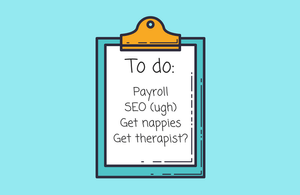 I went through a phase of writing without giving SEO factors much thought. Quality content would surely carry the day!
I went through a phase of writing without giving SEO factors much thought. Quality content would surely carry the day!
You know what – it wasn’t a bad strategy. But this ranking lark only gets harder and more competitive and more expensive. In 2018, there are still a few SEO factors that I actively worry about and write to.
N.B. my focus is mainly on Google’s patents and rumours specifically because…come on.
SEO factors on my worry list
1. Site age/authority
It was thought that Google used site registration as an indicator of age (for which, read authority) but many owners renew their site every year or even switch owners, so it’s not the strongest indicator of authority. Would such a clever company miss that flaw?
Action: create evergreen content that people will find value in over time, and continue to link to. As people continue to link to it, Google will continue to see value in that content.
2. Keywords
No, keyword stuffing is not back. However, relevance to a topic IS. You know your topic but the reader may be brand-new to it, so it must be easy to scan for relevance.
Action: perform keyword research for every page of a site, and make sure that you use the keywords for specific subjects on those pages and in prominent places, like the page titles, main headings, anchor text pointed to the pages and body content on the page. There doesn’t need to be a specific percentage of usage on the page, but you need to include the keywords you’ve selected for a page to rank for that term or phrase.
3. Headings
A site crawler will use code that indicates importance (like H1, H2 etc.) to help establish the topic – just like a human will. And when it comes to Google, there are actual humans involved in judging quality, too.
Action: make sure that titles, main headings, and headings for lists on pages are descriptive of the content underneath, and include keywords and related phrases that fit in with the content on the pages that they appear on.
4. Page speed
Page speed for mobile and desktop is a huge deal for Google in particular. For every second our site takes to load, we lose 20% of people on average. Consider this your major SEO worry for 2018.
Action: review pages using tools such as PageSpeed Insights and Google’s Test My Site for mobile speed.
Stuff you can do to reduce load time include: reducing image file sizes, and redirects and broken links, extending browser cache times, minifying CSS and Javascript, and more. Ask a developer.
5. Semantic field
Building a page’s relevance for SEO value is about more than keywords. The synonyms of those keywords and related phrases help build the page’s semantic field. The word ‘insurance’ doesn’t help someone understand the kind of insurance, so related keywords and phrases would be: home insurance, cover, contents, protect, policy and so on.
Action: this one sounds obvious but in really short copy or on image-heavy pages, you do need to check there’s enough context.
6. Internal links
Links are great because they help your user jump to other content they’re interested in, keeping them onsite. However, Google is suspicious of links that no one clicks.
Action: when you link to other pages, the more likely it is that someone may click on those links, the more value ascribed by a search engine. Don’t only link keyword phrases – it’s a clear indication that you’re link-building. Use natural language that draws on the context around it to explain clearly to the user what they’ll find when they click.
7. Biometric parameters
You’re not going to like this but Google has a patent for using your front-facing camera to gauge your reaction to search results. How a user’s micro expressions change as they read SERPs may become a ranking factor.
Action: do nothing crazy. Your page descriptions should always be informative and enticing, so keep writing little ads for your content to pull people in.
8. Click-throughs
Obviously, the more people click through to our site, the better. But it’s also a ranking factor, so that’s another reason for our SERPs to be very nice indeed.
Action: try to get enhanced snippets for your SERPs by building content in excellent format. Numbered lists combined with top quality content is particularly good for this.
9. Brand queries
If people regularly search for your brand name in conjunction with a great keyword, it’s a clear indicator that you’re a good bet for that topic – like ‘HomeSafe home insurance’.
Action: get famous! This is all about brand exposure, so your work on social, ad campaigns and press coverage all contributes.
10. Link equity
Getting follow links to your site is great but if a search engine judges there to be no real likelihood of good traffic through that link, it may discount it.
Action: don’t just chase high authority links – think about whether the surrounding and destination content is great enough to get people to actually click through.
11. Freshness
This one isn’t about how new your content is (though that’s a consideration); it’s about how topical it is. Search engines appear to prioritise results that are relevant to an ongoing trend in the collective cultural consciousness.
Action: keep up with trends and global topics that affect your industry. Write about them.
Go try Google’s site quality checker to see if you have any major worries on your hands.
